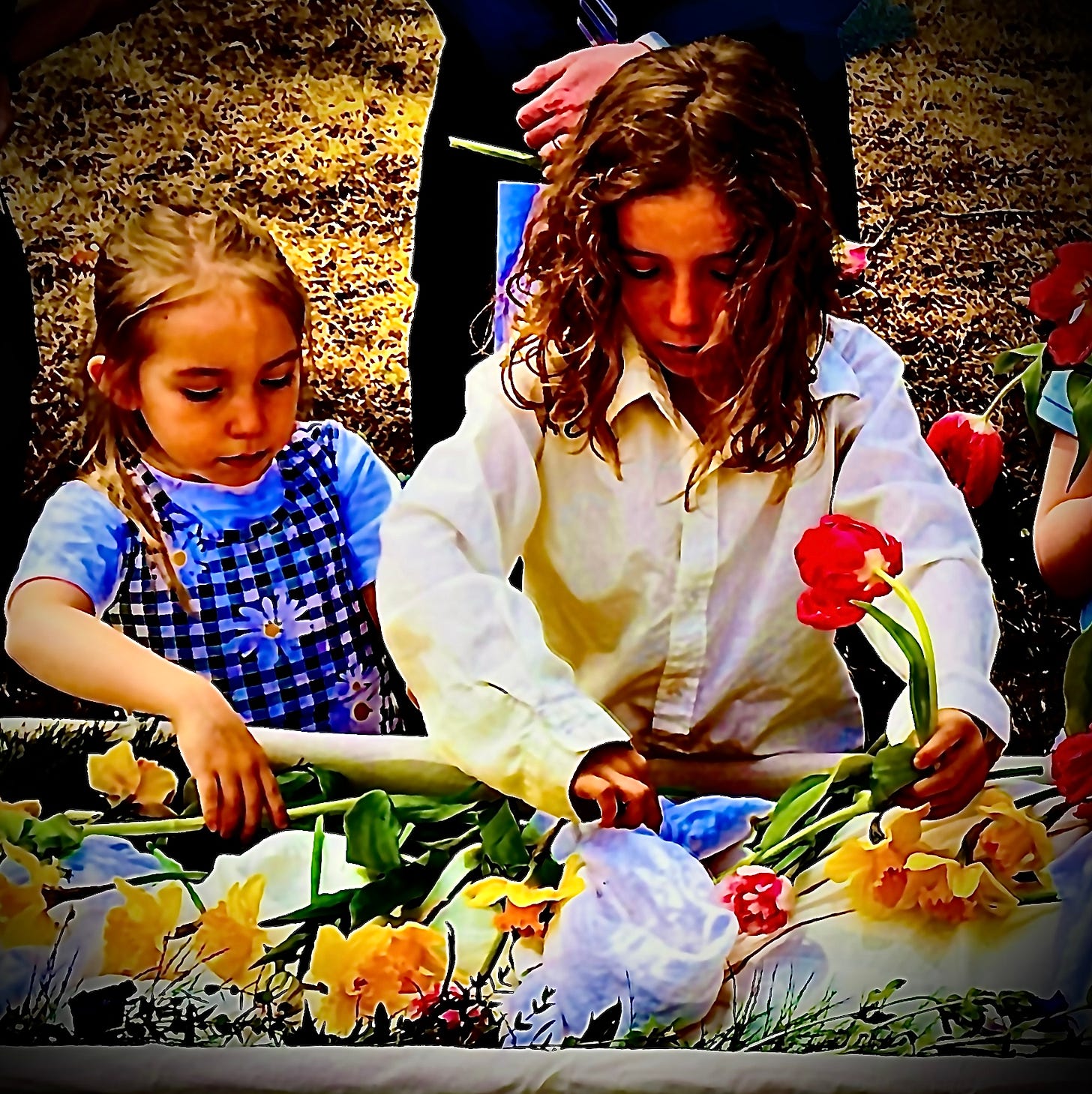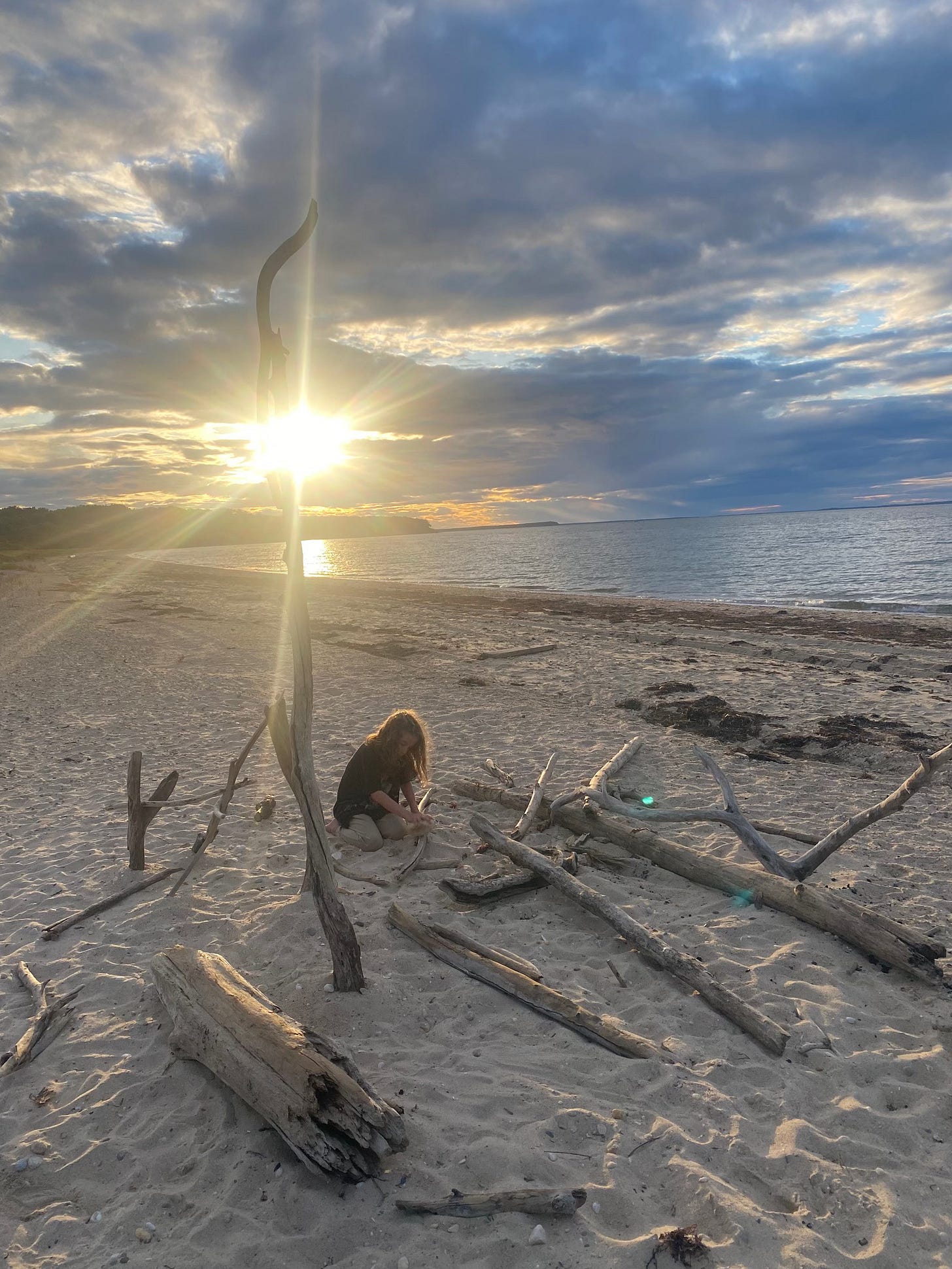We didn’t expect my mom’s knees to outlast her. Bent over the woven funeral basket, I felt her left patella through the linen shroud, torqued and enlarged.
“You really dodged having to have that shitty knee surgery!” I whispered to her dead ear.
Pancreatic cancer, an otherwise harsh matron, gave her a very, very, very long hall pass, whereby she could escape every other malady and inconvenience of older age.
And if we were looking for her (of course we were!), not to worry: she was just delayed in the bathroom, washing her hands extra fastidiously, or stranded without toilet paper (why is the so-called women’s room always short of supply?). Something mundane must have detained her, something fanciful.
Silly us, thinking she had gone off irreparably! And where was her hall buddy, supposedly ensuring she didn’t wander off into the school broom closet? Who would come running for our aid if she tumbled on the linoleum, rushing back to us, klutz as she sometimes was?
Sometimes metaphors go too far, don’t they. But I am a supplicant at the mercy of language, seeking my mother before she becomes the kinds of fossils my kids obsess over.
“Oh, this?” I’ll say, when they ask, with noses scrunched scientifically and magnifying glass brandished, what the earth coughed up. “It might look like a lumpy tortoise, but THIS is the sacred knee cap of your elder!”
The cemetery gives you about an hour to complete your ritual. The feminist director told us the hardest part is leaving the body behind, like clearing the last weeping clumsy drunkard out of a house party in high school at 3am. I didn’t believe her, because I was never going to leave the body. I was also always the person cajoling the trashed partier towards the sidewalk and recuperative sleep, drunk as I might have been myself (sorry mom).
As the hole 8-feet deep in the ground waited for her, all but the youngest grandchild, who napped in the mini-van on the graveside gravel road, laid long-stemmed flowers— yellow, pink, purple, white— over her body.
Boy, would she have kvelled about this extravagance, the way she always did when we brought bouquets to the house, acting like our thoughtfulness deserved a MacArthur Genius Award. (Still waiting, committee— you have my correct email, yes?) Sensitive to smell as a newly pregnant person, she always remarked how their scent — even carnations, the white bread of flowers— was just so good. Like any artist worth their salt, her comment rendered the obvious novel.
Daffodils, it turns out, beyond being spring’s fling, are also poisonous ingested in quantity. The baby had lightly tested this (and so I had googled it, horrified) in her constant gastronomic pioneering from the floor—which accelerated as my mom decelerated—slipping into her mouth the drooping, shriveled and then fallen cuttings from my parents’ backyard.
“She’s fine,” my overconfident 9 year-old assured me, mimicking my husband’s line, without looking up from his kindle.
Perhaps ingesting one single desiccated petal would function instead as homeopathy, and the baby would rise above all mortal preoccupation to scorn death, and fetch mom from eternity’s esophagus. Or far more likely, she’d fuss and puke it up and carry on.
Her seven grandchildren were, to my mom, “the bees knees” a phrase from 1920’s nonsense parlance for something of truly excellent quality. All children are “just children” to someone, apex of all precious phenomena to someone else. On that first Friday in April, in the green burial area of the cemetery, they took over the ceremony. Sun broke through as if keeping metaphysical score.
New bees of the season were out, struggling, like us, to make sense of things. Perhaps their bee parents had warned them it could suck out there. Imagine their good luck, then, to stumble upon our armfuls of imported blossoms, when the local grass was only just beginning to sprout like a pubescent’s moustache.
Both newborns and the dying hardly know what to do with their limbs, forget about feeling pressure to fulfill idioms. By contrast, bees put theirs to great use: it turns out they have 6 knees, all fabulously bendy, with which to crawl around in furious honey-seeking parkour. However their average life span falls somewhere between that of a cut flower and our own, only about 5 weeks. A bit longer than remained of my mom’s when we learned the chemo had done nothing.
Then suddenly it had been 7 weeks since she died. And the bees of her funeral were also likely no longer alive. It’s true what people said: that each “first” without her (or your beloved, when their time comes) makes the grief fresh like closing your finger in a car door. And Grief catches up to you no matter where you go, atrociously athletic.
This past weekend we went to Long Island, to the beach, to celebrate my son’s 10th birthday. On Memorial Day, we’re also meant to honour and reflect on those who have served in wars, while the rest of us didn’t.
My mother did not make war on her cancer, as some the dominant pugilistic metaphors suggest.
She was more of a peace-song, anti-war Pete Seeger type. But you don’t “non-violently resist” your cancer. Nor did she “love” her cancer so as to not reject any part of herself, as certain positivity junkies advise— she was not a faker, nor spiritual aspirant.
What she loved was a different kind of growth: her grandkids, with their antics. The garden, with its antics. Her cancer was just some inevitable garbage. If she could, she would have left it in the public trash can at the end of the road, and returned to her spring routine of bringing her daffodils to any neighbor in need.
On the beach, to mark his first decade, my son hauled and sharpened huge driftwood sticks with rocks for hours in the sand and wind, erecting a monument to his childhood. My mom had claimed they were soulmates. OK, but now what? He has no money-back-guarantee access to her, or if he does he ensures it is none of my beeswax, like most things important to him I’m accidentally too wax-y about.
One fallen limb of a tree, long severed from its mother trunk, bent in a similarly startling angle to mom’s leg. I thought of children, whole families, being dismembered in bombings. The Miserable Fates, seasonal allergies making their eyes itch, cutting all the miserable threads too soon, while my son skipped stones at the shoreline, like he could bullseye the very sun.
Then, the first heavy carpenter bees with their splendiferous fantabulous half-dozen knees droned over my mom’s empty chair on the deck, and around my dad’s occupied one. Did you know bees can pass through a ghost with no drag on their speed? Did you know the presence or absence of people does not distort their apiary mission?
Ever the party-planner, my 6 year-old wrote celebratory notes, “Happy 10th Birthday Ro!!!!,” securing them with excessive reams of tape on the old walls that spat splinters at you when you approached.
She also made name tags for all the guests (our blended family) on bright yellow post-it’s, the pad pilfered from my mom’s bedside table (I admit to moving her pillow about so it appeared more used) with its pile of annotated books, and stuck them on the flimsy bedroom doors.
The baby pulled down the reachable ones, balled them up, and ate them. You know what they say about low-hanging post-it’s. Don’t you?
And for her own reasons, “Because everyone is Ema and Ema is with everyone!,” the 6 year-old also made 8 separate name tags for my mom. On our way to the table, we were to pick “Ema” up and bring her along, our VIP angel adjudicating my rendition of her pesto pasta salad, like advanced planners bring a doggie bag or epipen to a restaurant.
My fat tears blurred her red-marker stick figure doppelgängers, ink strokes thin as bee legs but 40,000 times their weight in sadness. “What is it?” My 10 year-old asked. “What?”
“Great art always makes me cry!” I explained, pointing at the small drawing in the spot where my mom should have been, bored of admitting I was crying because of her, or all of it.
“It’s because of Ema,” he corrected me, because we raised him to smell bullshit from five fathoms away, and because correcting people (alas, correctly) is his socially costly superpower.
My mom’s lopsided gait I would know anywhere. Her sigh and thump as she dropped in a chair, before a meal. The token ice packs she affixed to her knee, to abate the chronic inflammation and dodge the orthopedist’s table. The way I nested my hand around her distorted bone, and it answered back not as mother to plaintive child, but as a stone does.
Of course I understand her body, buried naturally, will give roots a purchase, and every year they will rise into new mini-meadows. I read all those lovely cycle of life books too, meant to console and connect.
But every step forward is also a severance package that takes me farther from her death, and I resent it. Far more than I resent quarterly estimated tax payments or socks with big toe holes, or a pen that runs out when you were about to scribble and pass to your crush an ill-advised and completely heartfelt confession, or the fact that my children are all emotional mind-readers.
So how to go on? Will my knees buckle, and refuse? Will I be forever prostrate before the pain of missing my mother?
Missing your parent, or another beloved, or thinking about a future where you might? Maybe send them a flower, write them a post-it, learn a bit about dying processes, tell the air how you really feel?
Resources for you:
Our Brooklyn-based (green) Funeral Director- Amy Cunningham.
Our Death Doula- Sula Johnson.
Suzanne O’Brien- Doulagivers, comprehensive death education and support. Her podcast and webinars helped me have a map and be willing to walk painful streets without detouring.
Needing a taste of Pete Seeger, while you tend your plants? Or to feel a tad more non-violent towards someone or something that’s a bit shitty? Put this Garden Song on repeat.
Worried about the world? Me too. That’s why I like this truth-to-power news source, that uses a smattering of f-bombs for emphasis only. And please remember, zero things improve when we throw trans people under the bus. The ACLU is here to help ensure that doesn’t happen.






